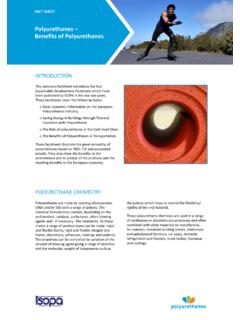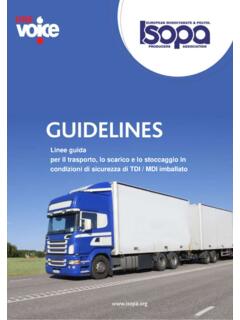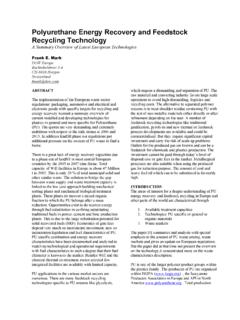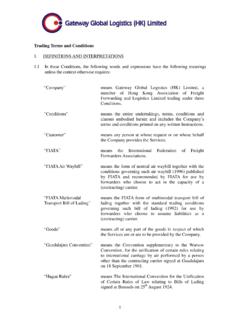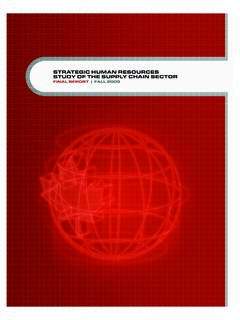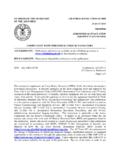Transcription of Emergency Response for Transport of TDI & MDI - …
1 1 Emergency Response for Transport of TDI & MDI September 2016 2 FOREWORD The second edition of the Emergency Response Manual for Transport of TDI and MDI , dated October 2003, has been thoroughly reviewed. The intention was to update information to incorporate the changes to the Mutual Aid Emergency Response Scheme as agreed between the ISOPA members companies and insure the coherence with the ICE Scheme (Intervention in Chemical Transport Emergencies ) developed by CEFIC. ISOPA Logistics Team 3 CONTENT 1 Introduction 4 Purpose 4 Adoption 4 MDI / TDI Products 4 Integration with ICE 4 Interpretation caveat 5 2 The Mutual Aid Scheme 6 3 The Emergency Response System 8 Introduction 8 Level of activity 8 Initiating the Mutual Aid Scheme 8 Requirements of the intervening companies 8 4 Guidelines for Dealing with MDI and TDI Incidents 9 Recording of information / Use of a Call Sheet 9 Level 1 Response - Advice by telephone 9 Level 2 Response - Advice by experts at the scene 10 Level 3 interventions - Procedure for special situations 12 5 Training of Emergency Response Personnel 14 ANNEXES 1 Chemistry of the reaction of
2 Diisocyanates with water 15 2 Properties, Hazards and Safety Information 16 3 Commercial names used for MDI and TDI 21 4 Technical help and information 22 5 Recommended equipment for dealing with MDI or TDI Transport Emergencies 23 6 ISOPA Emergency Call Information Sheet (CEFIC/ICE) 27 7 Incident Report Form 29 8 ICI Scheme - National Emergency Numbers 30 9 Mutual Aid Scheme - ISOPA Emergency Response Centers 31 4 1. INTRODUCTION PURPOSE This manual has been prepared by ISOPA, the European diisocyanates and Polyol Producers Association.
3 It is designed to augment and strengthen existing National and Company communication systems when dealing with TDI and MDI and to complement the ICE Scheme. It describes a mutual aid scheme whereby ISOPA companies have undertaken to respond as necessary on each other s behalf in order to ensure that expert assistance is available as quickly as possible at the scene of a Transport Emergency involving TDI or MDI. ADOPTION All ISOPA member companies have signed the convention for providing mutual aid in the case of incidents during the Transport of TDI and MDI. ISOPA will review and update (if necessary) this document every two years or whenever there are major changes or new experience or knowledge becomes available, whichever occurs first. ISOPA recommends that all parties active in the transportation and distribution of diisocyanates, consider to adopt these guidelines in order to be prepared in case of an incident.
4 MDI/TDI PRODUCTS Toluene Diisocyanate (TDI) is classified and regulated as hazardous for handling and Transport . The UN Sub-committee of Experts on Transport of Dangerous Goods decided in July 1994 to remove Diphenylmethane Diisocyanate (MDI) from the list of hazardous goods. However, MDI continues, quite properly, to be regulated in EU countries as hazardous material in handling and usage. For this reason it has been decided to continue to maintain MDI in the Emergency Response System. To avoid the need for repeated explanations in this document, wherever MDI is referred to as a dangerous good for transportation it should be understood in this sense. Properties, hazards and safety information for TDI and MDI is attached (see Annex 2). INTEGRATION WITH ICE Definition ICE: Intervention in Chemical Transport Emergencies: CEFIC co-operative program in the event of an incident during the Transport of goods to provide information, practical help and appropriate equipment to the competent Emergency authorities.
5 Participating Company /Company Member: Company who is member of ICE Scheme (TUIS, Transaid ,..) Company Product Group: Company who has signed a specific protocol Specific Protocols (Mutual Aid Scheme) : Diisocyanates (ISOPA) , Titanium Tetrachloride , Bromine , Ethylene Oxide 5 Flow Chart The chart illustrates the typical flow of information in case of accident on site or during transportation of dangerous goods. In such a case, the fire department can need assistance (advice by phone or on site or Response on site) from chemical industry experts. This assistance can be done using the ICE scheme (normally only for distribution incident) or a specific protocol as the ISOPA mutual aid protocol. When an expert cannot be found in the country, the ICE national center can contact other ICE national centers in Europe to obtain information or assistance. If ICE scheme and ISOPA mutual aid protocol (= specific protocol) are activated in parallel, it is important to implement a good communication between all parties involved (ICE National centers, ICE responders, Supplier and ISOPA Company responding).
6 INTERPRETATION CAVEAT The prime responsibility for dealing with Transport emergencies involving chemical and particularly dangerous goods rests with the national Emergency services in the country concerned. Nevertheless, Emergency services in many European countries (see annex 8) recognize that the chemical industry can provide a vital supporting role and therefore seek their expert advice and assistance on safe methods of handling, recovery and disposal of chemicals involved in Transport emergencies. The chemical company contacted for advice or assistance may be the manufacturer, supplier, importer or user of the chemicals, or may be selected for other reasons, for example, proximity to the scene of the Emergency . The ISOPA mutual aid scheme can be activated on its own or can complement the ICE scheme (see Annexes 4 and 8). It is the individual responsibility of users of this manual to evaluate and apply it while fully taking into account all specific circumstances and their own situation.
7 No part of this manual should be used or interpreted in a way which would conflict with existing international and/or national legislation, including competition law. In any case, applicable legal provision will always take precedence over any part of this manual. 6 2. THE MUTUAL AID SCHEME 1. The European Diisocyanate and Polyol producers who are members of ISOPA have established a system of mutual aid to deal with potential emergencies arising during the transportation of Toluene Diisocyanate, Diphenylmethane Diisocyanate or their derivatives in Europe. 2. The principles of the resulting Convention for providing mutual aid in the case of incidents during the Transport of TDI or MDI are as follows: a) In the event of any difficulty occurring during transportation of a shipment of either TDI (UN- Number 2078) or MDI or their derivatives forwarded by one of the participating COMPANIES (meaning ISOPA member Companies), such difficulty, in the supplier s opinion, having the possibility to cause damage to persons, property or the environment or preventing the safe continuation of transportation, then the said COMPANY may request another COMPANY closer to the scene of the incident to intervene.
8 B) In this context, transportation is taken to mean all of the activities associated with the Transport unit, including unloading. c) All COMPANIES will promptly respond to a request from another COMPANY which considers that there is a need for technical advice or assistance at the scene of the incident. d) The request for any intervention at the scene of the incident may be made by telephone but must be confirmed in writing or by email. e) Each of the COMPANIES may be requested to provide assistance from an appropriate Emergency Response Centre. The contact numbers are listed in Annex 8. f) The COMPANIES undertake to assist each other as far as is possible. The role of the intervening COMPANIES is to provide technical advice to the Emergency Authorities on the nature of the product and on the measures necessary to deal with the incident, and to provide technical assistance if requested by the Emergency Authorities.
9 G) A company which has asked another COMPANY to send staff to the scene of an incident remains responsible for the support given to the Authorities. The intervening COMPANY acts on behalf of the requesting COMPANY until a representative of the latter reaches the scene or until advised by the requesting COMPANY that they may withdraw. h) The intervening COMPANY will use its best efforts to keep the requesting COMPANY informed of progress. i) If asked by the requesting COMPANY, the intervening COMPANY and their equipment should be prepared to stay at the scene unless otherwise agreed between the requesting COMPANY and the intervening COMPANY. In any incident, where the Emergency Authorities are not involved, the intervention will be restricted to limiting any danger and to stabilizing the situation pending arrival at the scene of a representative of the requesting COMPANY.
10 J) If the Emergency Authorities in any country call for assistance from a company under the provisions of a formally binding national scheme, then the provisions of that scheme will be paramount. In such circumstances, the intervening COMPANY shall promptly advise the requesting COMPANY. k) In the event of force majeure the obligations of the Convention are removed but the intervening COMPANY should inform the requesting COMPANY of the event of the force 7 majeure as soon as possible. For the purpose of this clause force majeure means any cause beyond the reasonable control of the intervening COMPANY. l) In the case of intervention the intervening COMPANY will be reimbursed as soon as possible by the requesting COMPANY for all expenses so incurred during working and travelling from the location of the intervening COMPANY. m) The intervening COMPANY shall have no liability or responsibility for any damages suffered by the requesting COMPANY or a third party, and the requesting COMPANY shall indemnify the intervening COMPANY accordingly.


